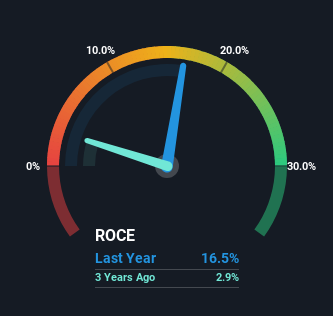- India
- /
- Auto Components
- /
- NSEI:ZFCVINDIA
ZF Commercial Vehicle Control Systems India (NSE:ZFCVINDIA) Will Be Hoping To Turn Its Returns On Capital Around
If you're not sure where to start when looking for the next multi-bagger, there are a few key trends you should keep an eye out for. One common approach is to try and find a company with returns on capital employed (ROCE) that are increasing, in conjunction with a growing amount of capital employed. Put simply, these types of businesses are compounding machines, meaning they are continually reinvesting their earnings at ever-higher rates of return. However, after briefly looking over the numbers, we don't think ZF Commercial Vehicle Control Systems India (NSE:ZFCVINDIA) has the makings of a multi-bagger going forward, but let's have a look at why that may be.
What Is Return On Capital Employed (ROCE)?
For those who don't know, ROCE is a measure of a company's yearly pre-tax profit (its return), relative to the capital employed in the business. Analysts use this formula to calculate it for ZF Commercial Vehicle Control Systems India:
Return on Capital Employed = Earnings Before Interest and Tax (EBIT) ÷ (Total Assets - Current Liabilities)
0.17 = ₹4.4b ÷ (₹32b - ₹5.5b) (Based on the trailing twelve months to September 2023).
Therefore, ZF Commercial Vehicle Control Systems India has an ROCE of 17%. That's a relatively normal return on capital, and it's around the 14% generated by the Auto Components industry.
See our latest analysis for ZF Commercial Vehicle Control Systems India

In the above chart we have measured ZF Commercial Vehicle Control Systems India's prior ROCE against its prior performance, but the future is arguably more important. If you'd like to see what analysts are forecasting going forward, you should check out our free report for ZF Commercial Vehicle Control Systems India.
The Trend Of ROCE
In terms of ZF Commercial Vehicle Control Systems India's historical ROCE movements, the trend isn't fantastic. Around five years ago the returns on capital were 26%, but since then they've fallen to 17%. Although, given both revenue and the amount of assets employed in the business have increased, it could suggest the company is investing in growth, and the extra capital has led to a short-term reduction in ROCE. And if the increased capital generates additional returns, the business, and thus shareholders, will benefit in the long run.
Our Take On ZF Commercial Vehicle Control Systems India's ROCE
While returns have fallen for ZF Commercial Vehicle Control Systems India in recent times, we're encouraged to see that sales are growing and that the business is reinvesting in its operations. And the stock has done incredibly well with a 163% return over the last five years, so long term investors are no doubt ecstatic with that result. So while investors seem to be recognizing these promising trends, we would look further into this stock to make sure the other metrics justify the positive view.
ZF Commercial Vehicle Control Systems India does have some risks though, and we've spotted 1 warning sign for ZF Commercial Vehicle Control Systems India that you might be interested in.
If you want to search for solid companies with great earnings, check out this free list of companies with good balance sheets and impressive returns on equity.
Valuation is complex, but we're here to simplify it.
Discover if ZF Commercial Vehicle Control Systems India might be undervalued or overvalued with our detailed analysis, featuring fair value estimates, potential risks, dividends, insider trades, and its financial condition.
Access Free AnalysisHave feedback on this article? Concerned about the content? Get in touch with us directly. Alternatively, email editorial-team (at) simplywallst.com.
This article by Simply Wall St is general in nature. We provide commentary based on historical data and analyst forecasts only using an unbiased methodology and our articles are not intended to be financial advice. It does not constitute a recommendation to buy or sell any stock, and does not take account of your objectives, or your financial situation. We aim to bring you long-term focused analysis driven by fundamental data. Note that our analysis may not factor in the latest price-sensitive company announcements or qualitative material. Simply Wall St has no position in any stocks mentioned.
About NSEI:ZFCVINDIA
ZF Commercial Vehicle Control Systems India
Engages in supplying systems for automotive and industrial technology in India and internationally.
Flawless balance sheet with proven track record and pays a dividend.
Similar Companies
Market Insights
Community Narratives


Recently Updated Narratives

Constellation Energy Dividends and Growth

CoreWeave's Revenue Expected to Rocket 77.88% in 5-Year Forecast

Bisalloy Steel Group will shine with a projected profit margin increase of 12.8%
Popular Narratives


MicroVision will explode future revenue by 380.37% with a vision towards success


NVDA: Expanding AI Demand Will Drive Major Data Center Investments Through 2026



